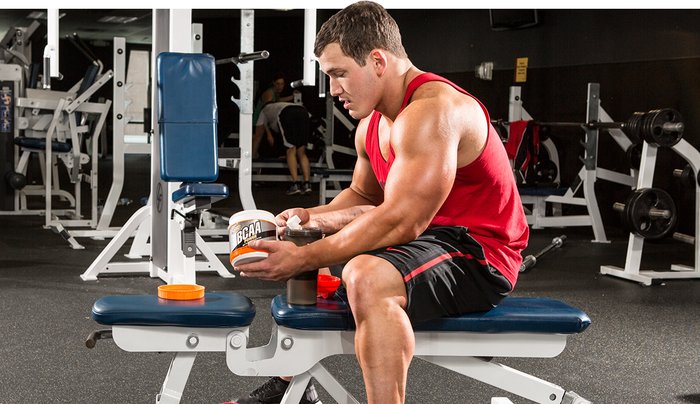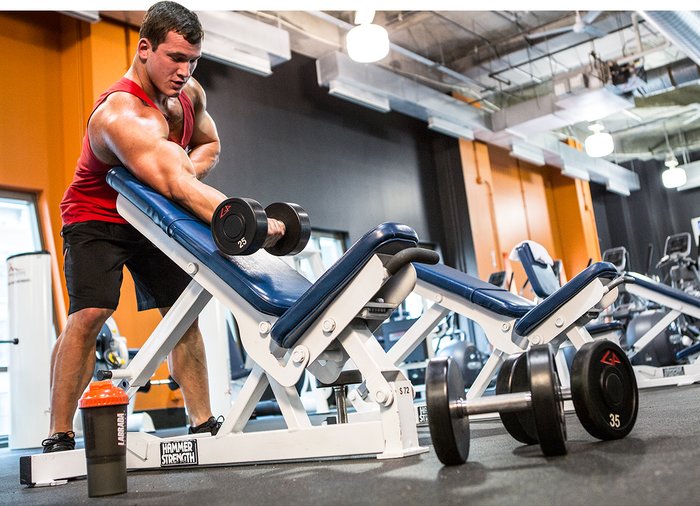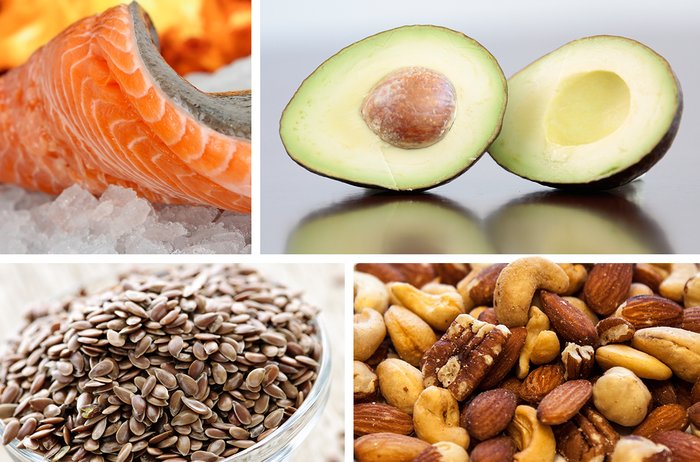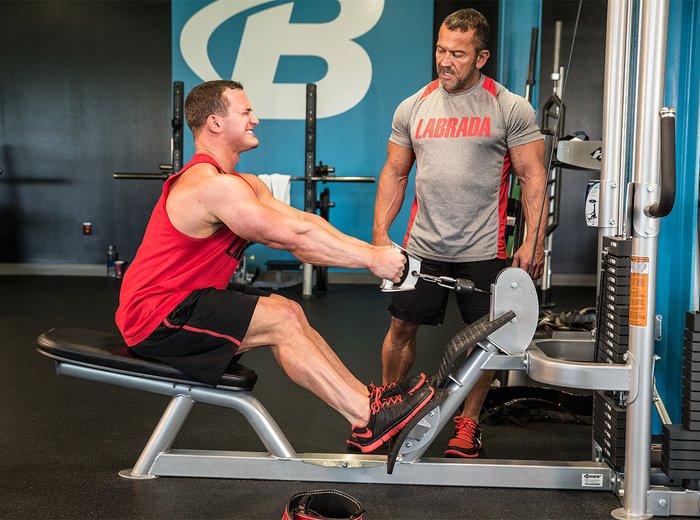1. Feed Your Body The Macros It Needs For Growth
The number one reason some people struggle to gain mass is that they consume an insufficient amount of food.
When trying to gain weight, you must consume more calories than you burn throughout the day. This results in a caloric surplus, and it is this surplus that your body uses to repair and build muscle tissue broken down by your training. There is simply no way around it.
The size of the caloric surplus required varies by individual, but if you have had trouble gaining weight in the past, a good starting point for your macros is consuming 1.25 grams of protein and 2 grams of carbs per pound of body weight per day.
When dialing in your surplus, make sure you eat the aforementioned amount of protein and carbs for at least one month before changing it. Doing so gives your body enough time to truly respond to the increase in calories. If you're gaining weight, you're eating enough; if you aren't, you need to eat more.
I would never recommend going over 1.5 grams of protein per pound of body weight, so if you have to add more calories, it should come in the form of carbs.
2. Never Go Longer Than Four Hours Without Eating
Regardless of what the 175-pound keyboard warrior says, meal timing is important when trying to put on mass, especially if you're trying to do it while gaining minimal fat. By eating at least once every four hours, you keep your body in an anabolic (muscle-building) state via a steady supply of nutrients to your muscles.
It's much easier to spread your gargantuan intake across multiple meals every 3-4 hours than it is to cram it into 3-4 big meals. Have you ever tried eating 1,200 clean calories in one sitting? I have, and I can tell you it almost ended with brown rice and chicken coming out of my ears.
It's far more practical to consume six meals at 600 calories each than three meals at 1,200 calories each.
3. Supplement With BCAAs Between Meals And Around Training
A surefire method to get the most out of the protein you consume throughout the day is to supplement with BCAAs. They provide an immediate source of fuel for your muscle tissue, and unlike whole-food proteins or even whey isolate, BCAAs are easily absorbed into the bloodstream. This nearly instant rise in blood levels of BCAAs provides your muscle tissue with the readily available fuel it needs to carry out protein synthesis.
BCAAs offer several beneficial muscle-building and recovery benefits backed by research. These include increased rates of protein synthesis, reduced muscle protein breakdown, and reduced markers of soreness.
Impressively, a study out of The Journal of the Federation of American Societies for Experimental Biology demonstrated that taking BCAA about two hours after a meal prolonged muscle protein synthesis. Although the study was conducted in rats, researchers saw no reason why this wouldn't apply to humans as well.
Although there is no direct evidence supporting increases in muscle strength and size when supplementing with BCAAs, having the ability to recover quickly allows you to train at or near full strength the next day, which, over time, will certainly help to propel your gains!
BCAAs have a high concentration of the amino acid leucine, which is a critical stimulator of the mTOR pathway, and subsequently muscle protein synthesis. Most BCAA supplements provide BCAAs in a 2:1:1 ratio of leucine to valine to isoleucine.
So in order to get the 3.5 grams of leucine that research suggests leads to the maximum activation of the mTOR pathway, consume 7 grams of BCAAs 30-45 minutes before two of your meals.

4. Sleep At Least Eight Hours Per Night

This is one that I can personally attest makes a huge difference, because I'm guilty of not sleeping enough. When you sleep, your body is in a resting state that burns far fewer calories than when you're up and about and doing things. Sleep is also the time when your body can devote a lot more energy to repairing damaged muscle tissue.
Another key benefit of sleeping enough is that during sleep, your body releases growth hormone, which can help aid in recovery. Missing out on eight hours of sleep can leave you feeling foggy, lethargic, irritable, and possibly even depressed.
Aim for at least eight hours per night, a duration that will help with recovery and get you ready to crush your next day's tasks and workouts.
Supplements that help with sleep include tryptophan and melatonin. Magnesium may help with sleep as well.
5. Decrease The Training Volume, Increase The Intensity
Other very common mistakes made by people who are trying to gain weight include:
- Performing way too many sets per workout
- Not using a weight that truly challenges their bodies
- Resting too long between sets

If you're in the gym for longer than an hour and 15 minutes, you're either doing way too many sets or resting way too long between sets.
If you're in the gym for longer than an hour and 15 minutes, you're either doing way too many sets or resting way too long between sets. Correcting these problems can lead to increased gains and less time spent at the gym. Instead, you could be getting an extra meal or sleeping an extra hour.
Aim to do 16-18 sets for large body parts and 12-14 sets for smaller body parts. Choose a weight heavy enough that you can stop 1-2 reps short of failure during your desired rep range, but light enough that you can get there using good form and truly feeling it in the muscle you are training.
As far as rest periods go, never take longer than 90 seconds between sets. I prefer to be closer to 60 seconds, as I feel I get the best stimulation and pump from this interval. The only exceptions to this rule are squats and deadlifts.
The best rule of thumb is to rest long enough for your breathing to normalize after your set, as this is a sign you have replenished the enormous oxygen deficit these exercises can create.
6. Consume Enough Healthy Fats
If you are struggling to get in enough calories due to not being able to eat enough, fats can be a great source of extra calories. A gram of fat yields 9 calories, versus the 4 calories per gram that carbohydrates or protein contain. So fats have over twice the caloric content.
Make sure as much of your daily fat intake as possible comes from fats high in monounsaturated and polyunsaturated fats. Foods and oils containing these fats include avocados, olive oil, nuts, natural nut butters, seeds, and oily fish such as salmon and mackerel.

Make sure as much of your daily fat intake as possible comes from fats high in monounsaturated and polyunsaturated fats. Foods and oils containing these fats include avocados, olive oil, nuts, natural nut butters, seeds, and oily fish such as salmon and mackerel.
Consider supplementing with omega-3 fish oil as well. Aim for 2 grams of omega-3 fatty acids per day (equal parts EPA and DHA). For optimal absorption, take it in the morning with a fat source. When taken in the recommended amounts, these fats may help with fat loss, optimize hormone production and brain function, and support healthier skin and nails.
7. Don't Skip Leg Day
Seriously, don't. Aside from taking the risk of being on the receiving end of jokes, becoming Internet infamous in a meme, and looking like an upside-down triangle, you are leaving some serious growth on the table if you don't train legs—and train them hard—at least once a week.
Research has shown that performing exercises that recruit a large amount of your body's skeletomuscular system (think squats and deadlifts) will cause a hormonal response that boosts circulating free-testosterone levels and growth-hormone levels. This can translate to more muscle tissue and a favorable body recomposition. In other words, you'll get jacked and burn fat!
I can personally attest to this one; during periods in my training where I am not squatting or deadlifting regularly, I don't feel as strong in any of my lifts, and I don't feel I progress as fast as I do when performing them.
8. Find A Training Partner Who Can Motivate You
This is a huge one for me. For one thing, having a good training partner holds you accountable to your training schedule. You're far more likely to go to the gym and put in your work when you know someone is relying on you to be there and train with them. No one wants to let a friend down, and that is exactly what you do when you skip out on a session with your partner. This has proven to be a strong tool for keeping me in the gym, even when I'm not feeling it.
Also, after training with the same person for a while, they are able to hold you accountable to achieving the proper intensity level in each set. A good training partner will be the first one to call you out and say you can do more reps, go heavier, or do something better—and you will be better off because of it.

Having a good training partner holds you accountable to your training schedule. You're far more likely to go to the gym and put in your work when you know someone is relying on you to be there and train with them.
Last but not least, a training partner can hold you accountable to training with the proper rest interval. You should be resting just long enough for your partner to hit his or her set, and then you should be right back at it.
This tempo you develop with a training partner can be invaluable. The motivation of someone who truly pushes you can make all the difference in your gains.
9. Supplement Wisely
If you've read any of my previous articles, you know I'm a big proponent of eating whole foods. That said, I truly believe there are some benefits of sports supplements that simply cannot be had from whole foods alone. I also believe that some holes in even the most balanced diet can only be filled by supplements.
The first supplement that falls into the must-have category is a quality whey protein. This will provide your body with rapidly digested and easily absorbed protein—perfect for right before training, right after training, or both. Heck, it works any time of the day as a protein source!
Research shows that you can gain more muscle at a faster rate by supplementing with whey than when not.
The second supplement I consider a must-have is BCAAs, for reasons I already enumerated in Resolution No. 3.
The last supplement I consider a must-have—at least for me and the people I talk to and lift with—is a good pre-workout. Not only does it provide a kick of energy that can help power you through your workout, but if you select the right formula, you can actually get the appropriate doses of several proven performance-enhancing ingredients with one product.
Keep in mind, however, that the ingredients you include as a part of your pre-workout may need to be taken consistently to have any benefit. Creatine monohydrate and beta-alanine rely on consistent supplementation to positively affect your performance. On the other hand, if you're looking for an immediate boost, look for ingredients such as caffeine or citrulline malate to supercharge your workout.
Regardless of the brand you select, do your homework, and make sure you're getting your money's worth by selecting one that has efficacious amounts of the actives, and not just stimulants that make you feel like you need to be scraped off the ceiling 30 minutes after you take it.

10. Have At Least One Active-Rest Day Per Week
You may have heard this before, but if you haven't, I'll let you in on a little secret: You don't grow in the gym!
In fact, you do the opposite, because when you are in the gym, you are damaging and breaking down muscle tissue. It's what you do outside of the gym that allows your body to repair the damage, and this in turn causes muscles to grow bigger and stronger. In light of this, I firmly believe in taking at least one active-rest day per week. Notice I didn't say "off day." I said active-rest day.
The goal of this day is to give your muscles and nervous system a break from the strain of weight training and to actively promote recovery. This can be done in a number of ways. My personal favorites are a lot of foam rolling, light cardio, and static stretching. Massages and tissue work are definitely nice, but not necessary.
The key to this day is to get your blood moving, work on getting the soreness out of your muscles, and if you're like me, using the two extra hours you have from not being in the gym to keep up with other areas of your life, including meal prep!

